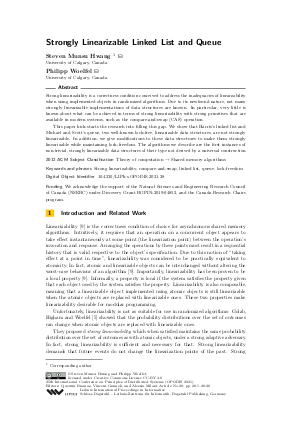Strongly Linearizable Linked List and Queue
Authors Steven Munsu Hwang, Philipp Woelfel
-
Part of:
Volume:
25th International Conference on Principles of Distributed Systems (OPODIS 2021)
Part of: Series: Leibniz International Proceedings in Informatics (LIPIcs)
Part of: Conference: International Conference on Principles of Distributed Systems (OPODIS) - License:
 Creative Commons Attribution 4.0 International license
Creative Commons Attribution 4.0 International license
- Publication Date: 2022-02-28
File

PDF
LIPIcs.OPODIS.2021.28.pdf
- Filesize: 0.67 MB
- 20 pages
Document Identifiers
Subject Classification
ACM Subject Classification
- Theory of computation → Shared memory algorithms
Keywords
- Strong linearizability
- compare-and-swap
- linked list
- queue
- lock-freedom
Metrics
- Access Statistics
-
Total Accesses (updated on a weekly basis)
0Document
0Metadata
Abstract
Strong linearizability is a correctness condition conceived to address the inadequacies of linearzability when using implemented objects in randomized algorithms. Due to its newfound nature, not many strongly linearizable implementations of data structures are known. In particular, very little is known about what can be achieved in terms of strong linearizability with strong primitives that are available in modern systems, such as the compare-and-swap (CAS) operation. This paper kick-starts the research into filling this gap. We show that Harris’s linked list and Michael and Scott’s queue, two well-known lock-free, linearizable data structures, are not strongly linearizable. In addition, we give modifications to these data structures to make them strongly linearizable while maintaining lock-freedom. The algorithms we describe are the first instances of non-trivial, strongly linearizable data structures of their type not derived by a universal construction.
Cite As Get BibTex
Steven Munsu Hwang and Philipp Woelfel. Strongly Linearizable Linked List and Queue. In 25th International Conference on Principles of Distributed Systems (OPODIS 2021). Leibniz International Proceedings in Informatics (LIPIcs), Volume 217, pp. 28:1-28:20, Schloss Dagstuhl – Leibniz-Zentrum für Informatik (2022)
https://doi.org/10.4230/LIPIcs.OPODIS.2021.28
BibTex
@InProceedings{hwang_et_al:LIPIcs.OPODIS.2021.28,
author = {Hwang, Steven Munsu and Woelfel, Philipp},
title = {{Strongly Linearizable Linked List and Queue}},
booktitle = {25th International Conference on Principles of Distributed Systems (OPODIS 2021)},
pages = {28:1--28:20},
series = {Leibniz International Proceedings in Informatics (LIPIcs)},
ISBN = {978-3-95977-219-8},
ISSN = {1868-8969},
year = {2022},
volume = {217},
editor = {Bramas, Quentin and Gramoli, Vincent and Milani, Alessia},
publisher = {Schloss Dagstuhl -- Leibniz-Zentrum f{\"u}r Informatik},
address = {Dagstuhl, Germany},
URL = {https://drops.dagstuhl.de/entities/document/10.4230/LIPIcs.OPODIS.2021.28},
URN = {urn:nbn:de:0030-drops-158030},
doi = {10.4230/LIPIcs.OPODIS.2021.28},
annote = {Keywords: Strong linearizability, compare-and-swap, linked list, queue, lock-freedom}
}
Author Details
Funding
We acknowledge the support of the Natural Sciences and Engineering Research Council of Canada (NSERC) under Discovery Grant RGPIN-2019-04852, and the Canada Research Chairs program.
References
-
H. Attiya, A. Castañeda, and D. Hendler. Nontrivial and universal helping for wait-free queues and stacks. Journal of Parallel and Distributed Computing, 121:1-14, 2018.

-
O. Denysyuk and P. Woelfel. Wait-freedom is harder than lock-freedom under strong linearizability. In International Symposium on Distributed Computing, pages 60-74, 2015.

- M.J. Fischer, N.A. Lynch, and M. Paterson. Impossibility of distributed consensus with one faulty process. Journal of the Association for Computing Machinery, 32(2):374-382, 1985. URL: https://doi.org/db/journals/jacm/FischerLP85.html,10.1145/3149.214121.
-
G. Giakkoupis, M.J. Giv, and P. Woelfel. Efficient randomized DCAS. In Proceedings of the 53rd Symposium on Theory of Computing, pages 1221-1234. ACM, 2021.

-
W. Golab, L. Higham, and P. Woelfel. Linearizable implementations do not suffice for randomized distributed computation. In Proceedings of the 43rd Symposium on Theory of Computing, pages 373-382, New York, NY, USA, 2011. Association for Computing Machinery.

-
T.L. Harris. A pragmatic implementation of non-blocking linked-lists. In Proceedings of the 15th International Conference on Distributed Computing, pages 300-314, Berlin, Heidelberg, 2001. Springer-Verlag.

-
M. Helmi, L. Higham, and P. Woelfel. Strongly linearizable implementations: possibilities and impossibilities. In Proceedings of the 2012 ACM symposium on Principles of Distributed Computing, pages 385-394, 2012.

-
M.P. Herlihy. Wait-free synchronization. ACM Trans. Program. Lang. Syst., 13(1):124-149, January 1991.

-
M.P. Herlihy and J.M. Wing. Linearizability: A correctness condition for concurrent objects. ACM Trans. Program. Lang. Syst., 12(3):463-492, July 1990.

-
M. Loui and H. Abu-Amara. Memory requirements for agreement among unreliable asynchronous processes. Advances in Computing research, 4:163-183, 1987.

-
M.M. Michael and M.L. Scott. Simple, fast, and practical non-blocking and blocking concurrent queue algorithms. In Proceedings of the Fifteenth Annual ACM Symposium on Principles of Distributed Computing, pages 267-275, New York, NY, USA, 1996. Association for Computing Machinery.

-
S. Ovens and P. Woelfel. Strongly linearizable implementations of snapshots and other types. In Proceedings of the 2019 ACM Symposium on Principles of Distributed Computing, PODC 2019, pages 197-206. ACM, 2019.

